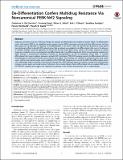De-Differentiation Confers Multidrug Resistance Via Noncanonical PERK-Nrf2 Signaling
Author(s)
Del Vecchio, Catherine A.; Feng, Yuxiong; Sokol, Ethan Samuel; Tillman, Erik J.; Sanduja, Sandhya; Reinhardt, Ferenc; Gupta, Piyush; ... Show more Show less
DownloadVecchio-2014-De-Differentiation C.pdf (1.933Mb)
PUBLISHER_CC
Publisher with Creative Commons License
Creative Commons Attribution
Terms of use
Metadata
Show full item recordAbstract
Malignant carcinomas that recur following therapy are typically de-differentiated and multidrug resistant (MDR). De-differentiated cancer cells acquire MDR by up-regulating reactive oxygen species (ROS)–scavenging enzymes and drug efflux pumps, but how these genes are up-regulated in response to de-differentiation is not known. Here, we examine this question by using global transcriptional profiling to identify ROS-induced genes that are already up-regulated in de-differentiated cells, even in the absence of oxidative damage. Using this approach, we found that the Nrf2 transcription factor, which is the master regulator of cellular responses to oxidative stress, is preactivated in de-differentiated cells. In de-differentiated cells, Nrf2 is not activated by oxidation but rather through a noncanonical mechanism involving its phosphorylation by the ER membrane kinase PERK. In contrast, differentiated cells require oxidative damage to activate Nrf2. Constitutive PERK-Nrf2 signaling protects de-differentiated cells from chemotherapy by reducing ROS levels and increasing drug efflux. These findings are validated in therapy-resistant basal breast cancer cell lines and animal models, where inhibition of the PERK-Nrf2 signaling axis reversed the MDR of de-differentiated cancer cells. Additionally, analysis of patient tumor datasets showed that a PERK pathway signature correlates strongly with chemotherapy resistance, tumor grade, and overall survival. Collectively, these results indicate that de-differentiated cells up-regulate MDR genes via PERK-Nrf2 signaling and suggest that targeting this pathway could sensitize drug-resistant cells to chemotherapy.
Date issued
2014-09Department
Massachusetts Institute of Technology. Department of Biology; Koch Institute for Integrative Cancer Research at MITJournal
PLoS Biology
Publisher
Public Library of Science
Citation
Del Vecchio, Catherine A., Yuxiong Feng, Ethan S. Sokol, Erik J. Tillman, Sandhya Sanduja, Ferenc Reinhardt, and Piyush B. Gupta. “De-Differentiation Confers Multidrug Resistance Via Noncanonical PERK-Nrf2 Signaling.” Edited by Douglas R. Green. PLoS Biology 12, no. 9 (September 9, 2014): e1001945.
Version: Final published version
ISSN
1545-7885